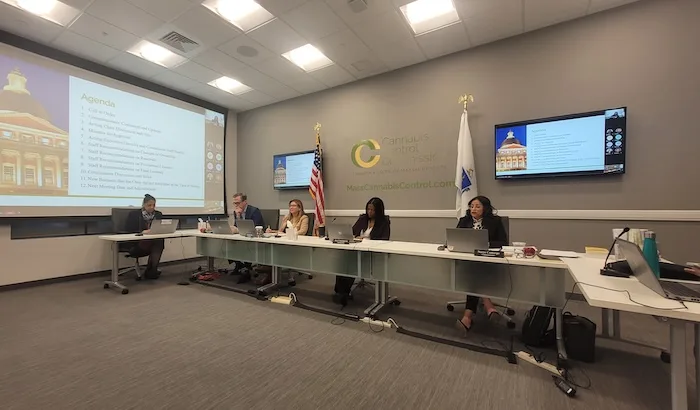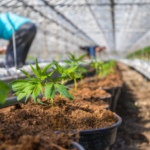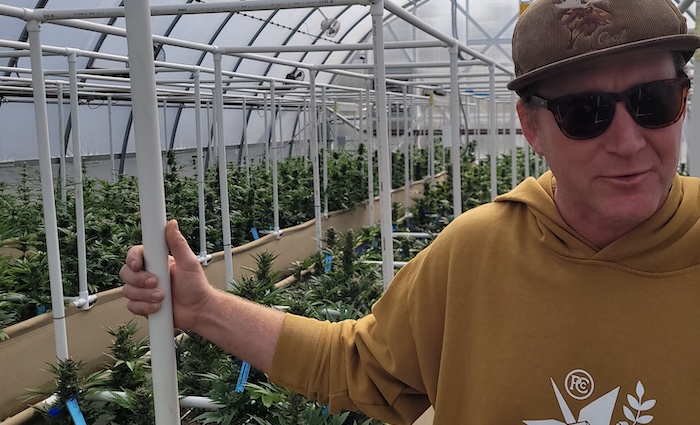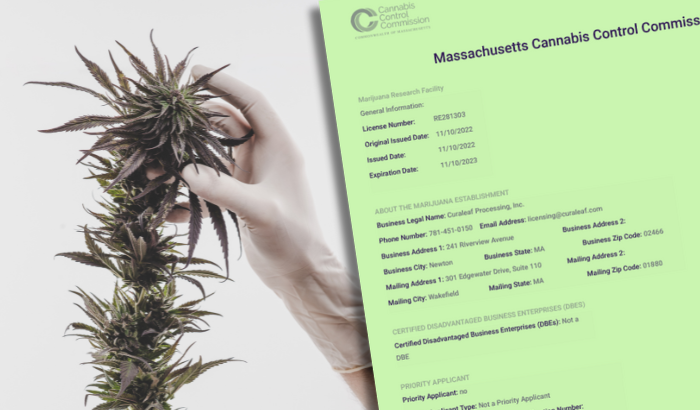
From badging, to addressing the nonpayment issue, to a doc on social equity, to record sales, worker safety, and dispensaries that sell scratch tickets
This week’s meeting of the Cannabis Control Commission was hardly the most exciting one in recent memory. There were barely any barbs or speed bumps, yet the body met for more than six-and-a-half hours and touched on a wide range of topics. Here’s our breakdown of events …
-Commissioners spent the first hour of Thursday’s meeting in executive session and off-camera, citing their right “to discuss strategy with respect to litigation if an open meeting may have a detrimental effect on the litigating position of the public body and the Chair so declares.” It’s anybody’s guess what they were talking about, but it’s hard to imagine the topic of a possible federal investigation into CCC business didn’t come up.
-Commissioner Bruce Stebbins spoke about two recent industry roundtable discussions that he participated in—one hosted by the Massachusetts Cannabis Coalition, and another by the Massachusetts Cannabis Business Association. His notes and dispatch offered insight into what is on the minds of stakeholders right now. For the former, issues of concern included: accounts receivable, badging (specifically, whether an individual’s badge should follow them from job to job, instead of being tied to the employer), advertising guidelines, testing conformity, social consumption, HCAs, delivery rules, and raising the maximum daily purchase amount.
For the Mass CBA, topics included community impact initiatives, potency testing standards, social consumption, education around THC and how it relates to the price of products, a draft omnibus bill proposing various regulatory changes, and the all-consuming topic of overdue invoices, the impact of late payments, and what can be done about it.
-For leads on how to wrangle the invoice issue and help licensees, CCC members are searching for solutions in other states, as well as in laws put in place by the Mass Alcoholic Beverages Control Commission. Among other guardrails, the ABCC maintains a delinquent list: “No licensee shall sell or deliver, directly or indirectly, alcoholic beverages to a licensee whose name is posted on the delinquent list, except for payment in cash on or before delivery, and no licensee who is posted on the delinquent list shall purchase or accept delivery of any alcoholic beverages except for payment in cash on or before delivery.”
-Commissioner Kimberly Roy noted the news that eclipsed all other cannabis headlines in Mass this past week—the new annual record set in 2023 of $1.56 billion in sales. Rock bottom shelf prices aside, overall sales increased by more than 5%. Roy touted the numbers, applauding “the entire supply chain” for seed-to-sale contributions to the industry.
-The centerpiece of Tuesday’s meeting was a presentation by Silea Williams, the commission’s director of equity programming and community outreach. In preparing to recruit the fourth cohort of its Social Equity Program, CCC members and staffers looked back on the first three sessions in order to improve efficacy. This time, they are especially focused on the initial educational track on entrepreneurship, as well as executive and managerial-level training. They’re also expanding the ancillary track for those who are interested in non- leaf-touching business opportunities, plus having open office hours, a new dedicated email for questions, and targeted outreach to impacted areas across the commonwealth.
As a highlight, Williams played a new 10-minute documentary called “Faces of Equity.” Connecting decades of the failed war on drugs to current equity initiatives in the legal industry, the film also features real talk from a number of people who have been through the Social Equity Program. Renata Caines of the Boston Garden talks about how contractors gouge weed businesses, while Alissa Nowak of Lucky Green Ladies talks about her journey from arrest to business ownership, and Ulysses Youngblood of Major Bloom retraces his experience of having to leave college for suspicion of smoking.
“It’s relevant,” Commissioner Nurys Camargo said of the video. “That was a labor of love and a back and forth with vendors.” Acting Chair Ava Callender Concepcion added, “I urge everyone to check it out. I was really proud of the work.”
-During the monthly overview of license application data, Commissioner Camargo zoomed in on the puzzling number of applicants in the Marijuana Cultivator category, saying the cluster calls for a serious discussion about market saturation. “When I look at the cultivation licenses, we’re at 126 in terms of cultivation [applicants who are currently in the Commence Operation stage]. There’s about 30 in the Final License stage, and then 187 on the Provisional License. And who knows where they’re stuck? And what they’re doing, and how long it’s going to take.
“I think most of us are going into our fourth year with the commission and I’m nervous about the market saturation in terms of cultivation. I know we’re going to be talking later on in a few months about more policy changes and regulatory stuff, but are we tracking these provisional licenses as far as where they’re at and how they’re moving to then determine market saturation?”
CCC Licensing Analyst Derek Chamberlin responded: “The best we can do is a tracking of the total amount of tier relative to each category, from pending through commenced operations. So we certainly have insight into the amount of potential tier that is coming our way. And if I were to crunch those types of numbers, I would want to look at just a breakdown in terms of the time on average that we have between each section over time.” For example, how long it takes for the average applicant to graduate from Pending Application status to Commence Operation.
Camargo wants to keep the conversation about people who may be stuck in the pipeline going. “We can either leave it to the next commission,” she said, “or we can start talking about it now. … I don’t want to make it another thing [for them to have to work on right now], but I’m thinking long term.” Commissioner Stebbins recognized the need for prudence, but noted record-breaking sales along with the significant number of jobs the many new businesses coming online bring to Mass.
-Besides major issues like social consumption and the model Host Community Agreement, and changes to the delivery license guidelines that are already in motion, it’s unlikely the commission will engage any additional massive considerations until a new executive director is hired. During a check-in about how things are going with the acting executive director as the agency dives headfirst into a search for a new permanent person to fill the position, Stebbins said, “I want us to be mindful and cautious of taking on some longer-range objectives in advance of hiring our next executive director.”
-Acting Chair Concepcion highlighted a new CCC bulletin on Safe and Sanitary Requirements for the Processing of Marijuana. The document is part of the agency’s long-term response to the tragic “work-related fatality” of Lorna McMurrey in January 2022 following her experiencing respiratory complications on multiple shifts at Trulieve’s Holyoke processing facility. Concepcion said it “speaks to different jurisdictions,” and is a “continued collaboration between the Cannabis Control Commission and our sister agencies as well as the federal government. This includes the Department of Public Health and federal agencies such as OSHA.”
Among other things, the bulletin states: “All Licensees must harvest, dry, cure, trim, and separate parts of the Marijuana plant in a safe and sanitary manner. In other words, Licensees must take into consideration the danger or harm that processing Marijuana may have on the health and safety of employees engaged in those activities, as well as patients and consumers, and take proactive steps to avert that potential harm.”
Toward the end of Thursday’s meeting, Concepcion said, “It’s really for members of the public to know. … and for licensees to know what is to be expected of them. This is meant as an educational and informational tool. … Worker safety is the focus. … The commission is really committed to ensuring that both are licenses and the agents, people who are working in the establishments, are aware of the provisions in place to ensure adequate worker safety. We’re also making sure people are aware of the opportunity to reach out to the Cannabis Control Commission with any concerns or questions.”
-Apparently, there is a dispensary out there that’s selling lotto tickets. We’re not sure if they have a folding table where seniors can come to drink miniature cups of Dunks coffee while playing Keno all day, or if it’s more of a scratch-ticket situation, but acting Chair Concepcion mentioned twice that something lottery related will be addressed at an upcoming commission meeting. There also may be some kind of statutory complication as a result of the presumed intermingling of gambling and ganja, so we are betting it will make for quite an interesting legal discussion.
-Finally, while the next CCC meeting on the official calendar is on March 7, commissioners said they will be scheduling an additional meeting in February.
























